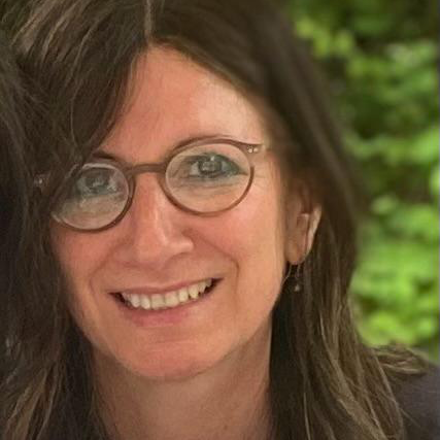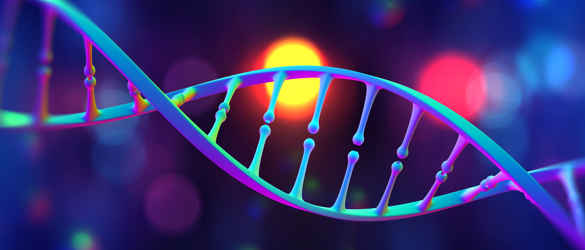Genetic counselling and how it helps you
Posted: Tuesday 02 September 2025
What role does genetics play in macular disease? And what is the role of a genetic counsellor? In a recent webinar, Eleanor Schiff, a genetic counsellor at Moorfields Eye Hospital, explained her role, why it’s important, and what families can expect if they decide to explore it.
What is genetic counselling?
Genetic counselling helps people understand how changes in their genes can affect health and can talk them through decisions about testing and its implications.
Eleanor said: “You might think of us as someone who is a translator or a guide because we help people understand how their genes, those are the instructions in our cells, tell the body how to make everything so how our genes work and how they can influence our health.
“We guide people through the genetic clinics and through any testing that they might do. And when the results come through, we go through that with them and explain what they mean and where they can go with that.”
Elena’s work also includes helping families understand how conditions are passed on, what their risks are, and what support is available.
What happens in a genetics clinic?
What happens in a genetic clinic if somebody is referred? Elena explained: “We don't only ask about their medical history, we actually ask about their family history. And we might draw with them what we call a pedigree or a family tree that might go back several generations, if possible.
“And we ask a lot of questions. That's not because we're nosy, and it's not because we're inquisitive and intrusive. But really, the questions that we ask are going to help us work out what condition they might have and how they're inherited, how that condition is inherited.”
A genetic counsellor will search for clues as to what genes that could be causing the macular condition and how it might be inherited.
More about genes
Genetic counsellors often start by explaining how genes work. Elena said: “We all have inside our cells our DNA, and that's the hereditary instructions.”
She added: “But sometimes there are changes in our DNA and that would mean that somebody has a gene that isn't giving the correct instruction to the body, and something won't work as it should.”
For most of our genes, we have two copies. When we have children, we only pass on one of our two sets, and it's random which one we pass on because they'll get the other set from the other parent
“We each have two sets of chromosomes,” said Elena. “We have 23 pairs of chromosomes with all the genes on them, because we get one set from Mum and one set from Dad.”
There are different ways genes can be passed on in families. One type is autosomal recessive, another is autosomal dominant, and then there's X linked.
Elena highlighted how understanding the pattern of inheritance, helps people to understand their diagnosis and the risk.
“If we know what the gene is, then we actually know more about the prognosis,” she said. “We know what to expect of it in the future.”
What does a genetic counsellor do?
The role of a genetic counsellor is both practical and emotional. Elena said: “We might draw with them what we call a pedigree or a family tree that might go back several generations.”
But the job isn’t just about explaining science. She said: “Genetic counselling is about more than just testing. It’s also about listening and explaining and supporting individuals and families as they navigate often very complex and very emotional information.”
Why consider genetic testing?
Genetic testing can provide clarity in three main areas: Confirming a diagnosis, understanding inheritance patterns and opening up opportunities for research and clinical trials.
Elena said: “Once we know what the gene is, we actually know how it’s inherited.”
She added: “Once we know what the gene is, if there’s a treatment or a trial for that gene, we would make sure that the people who are eligible would have access.”
The NHS now offers whole genome sequencing, which Elena described as “The most comprehensive testing that is available. It’s looking at the whole 3.2 billion letters in your DNA.”
The emotional side of genetic testing
Learning about genetics can bring up strong feelings Elena explained the emotions many families go through. “We can't help what we pass on, she said.” “But sometimes we pass on something, it did come from us, we know it came from us. And so, there's a sense of guilt, even though there's nothing we could do about it. And every single one of us carries genetic changes that could be harmful. So, people naturally feel guilt.”
Elena also highlighted other emotions that can come from a genetic diagnosis such as denial, anger and grief. But, she stressed that these emotions are only natural and many families she works with go through a very similar process.
But just because you visit a genetic counsellor does not mean you have to go ahead with testing. Elena said: “Nobody should feel pressurised,” she said. “Our job is very much to help them work out what’s the best thing for them.”
What should you do if you’re concerned?
If you have a family history of macular disease or your optometrist suspects a genetic condition, speak to a genetic counsellor to understand your options.
Speaking with a counsellor can help you understand your options.
Our webinars
Watch our latest webinars online. We asked the experts the questions you wanted answered: on food, staying safe at the eye clinic, and different macular conditions. Catch up with any webinars you missed, or watch again in your own time.
Genetic testing information
Explore valuable information about genetic testing for inherited macular conditions and find support from Macular Society for your family's well-being.




